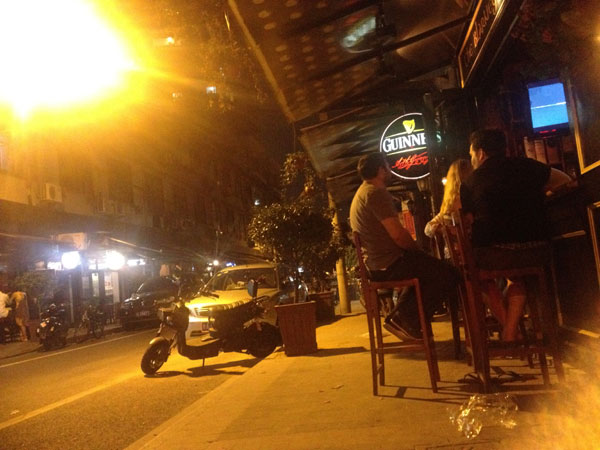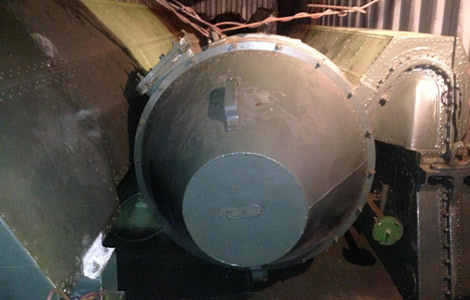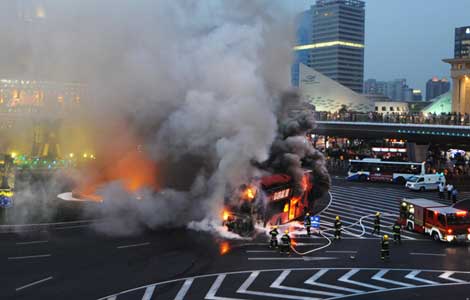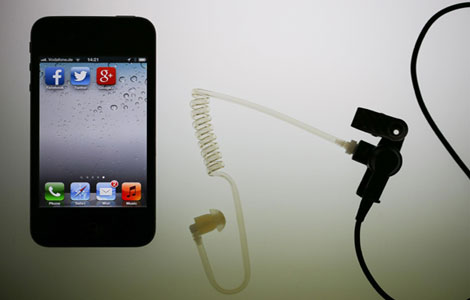Bar street heaven for expats, hell for locals
Updated: 2013-07-17 10:14
By Zhou Wenting (China Daily)
|
||||||||
Water attack
On March 9, several exasperated residents dumped water on a noisy crowd enjoying the nightlife on the street below. However, the drenching failed to dampen the crowd's enthusiasm or stop the noise.
"They didn't move away, they just jeered," said one second-floor resident, who preferred not to give her real name and asked to be called Liu. She admitted that the attack was not the first of its kind.
"We are not opposed to a cluster of bars opening in our neighborhood, and the last thing we want is to antagonize the expats. But the place has become a heaven for foreigners and a hell for locals," said Liu.
She said she was hospitalized twice in October because of a cerebral infarction, a type of stroke, and the noise prevents her from getting sufficient rest. "All the buildings on this street have wooden frames and are more than 70 years old. The floors shake constantly because of the loud noises downstairs."

 |
|
Expats enjoy a night out on Yongkang Road. Although their licenses stipulate that bars should close at 10 pm, many owners ignore the regulations and stay open much later. Gao Erqiang / China Daily |
The night of the water attack was particularly busy, according to Li Ting, who runs a vegetable stall nearby. "We could feel the waves of heat coming from Yongkang Road, even from two streets away. Some people parked their mopeds in the middle of the road and obstructed the traffic. They became louder and louder, jumping and screaming," she said.
Residents have asked why the local authorities haven't moved to stop the noise by preventing bar owners from placing tables and chairs outside the bars.
The Shanghai Environmental Pollution Control Regulations for the Catering Industry prohibit establishments that serve food from being located in residential buildings. But all the businesses on Yongkang Road have been granted licenses that allow them to operate as bars or restaurants.
Xu Zhian, a spokesman for the Yangpu district administration for industry and commerce, said if a business obtains the required permits from the food and drug administration and the environmental protection authority, which is responsible for checks on noise pollution, the administration has no reason not to issue a business license.
Meanwhile, an officer at Xuhui district's environmental protection bureau, surnamed Li, said the bureau is only authorized to investigate noise made by machinery or electronic equipment and the human voice is outside its scope of activity.
The police said they can ask people to keep the noise down, but admitted that there are no legal means of punishing the noisier revelers.
Xuhui district's urban management bureau has issued rectification notices against three bars that violated the regulations by placing tables outdoors. It has also spoken with bar owners and managers in a bid to ensure the sidewalks are kept clear.
"We've done a lot to ease the tensions, such as encouraging the bosses to close the bars at the agreed times and install soundproof windows for the residents," said an information officer surnamed Ding from the Tianping sub-district of Xuhui.
She said the district government has high hopes for the development of the bar street, which has spurred the renovation of Yongkang Road. "The facelift was meant to improve the surrounding environment and bring new business opportunities."
In the wake of the March water attack, the bar owners agreed to close by 10 pm, but Liu, whose 11-year-old grandson lives with her, is still not satisfied.
"The boy comes back from school at around 4:30 in the afternoon. Does he have to begin doing his homework after 10 pm?" she asked.
"Sometimes, just as I've been falling asleep at around 11 pm, the sudden screams from customers leaving the bars have disturbed me," she added.
Chi said her company holds weekly meetings with the bar managers to emphasize that they should stop taking orders at 9:30 pm and urge customers to leave by 10 pm.
"We're having a hard time between locals and the foreigners. We want to reduce the impact on residents as much as possible, but the two groups have their respective living habits," she said.
Miller said the bars will simply go out of business if they are forced to close at 10 pm: "It's when the expats are just getting warmed up."
Blaise understands that the buildings are old and the residents can easily hear the noise: "If I put myself in their position, I wouldn't like this place."
In a bid to mollify one resident, Blaise bought the man's room on the floor above his bar. He now uses the room as an office and the resident has moved to an apartment in a street 200 meters distant.
Chi said the bar owners considered buying the second- and third-floor rooms, but the plan fell through because the residents demanded unrealistic prices.
In June, the average price of a newly built residence in Shanghai was more than 28,400 yuan per square meter, according to the China Index Academy. Meanwhile, pre-owned apartments cost nearly 27,000 yuan per sq m, according to Soufun, an Internet real estate platform.
"My room is 15 square meters. If they paid me 10,000 yuan per square meter, how could I buy another apartment?" asked Liu.

 Panama finds 'missile equipment' aboard DPRK ship
Panama finds 'missile equipment' aboard DPRK ship
 Free on his feet
Free on his feet
 Extreme heat causing vehicle fires
Extreme heat causing vehicle fires
 Men, you look good in slim elegant cut
Men, you look good in slim elegant cut
 Luxury dresses in plastic
Luxury dresses in plastic
 Obama urges restraint amid protests
Obama urges restraint amid protests
 Putin wants Snowden to go, but asylum not ruled out
Putin wants Snowden to go, but asylum not ruled out
 Apple to probe death of Chinese using charging iPhone
Apple to probe death of Chinese using charging iPhone
Most Viewed
Editor's Picks

|

|

|

|

|

|
Today's Top News
Asiana crash passengers sue Boeing
Li highlights economic restructuring
Merkel's rivals go on attack over US spying
'Missile equipment' found aboard DPRK ship
Egypt's interim govt takes oath
Gay marriage to be legal in UK
China signs cooperation agreements with Belarus
Philippines' accusation refuted
US Weekly

|

|





